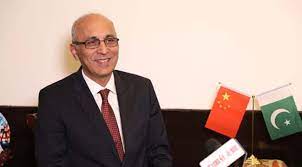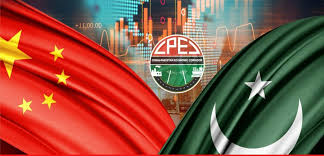Inviting third parties to CPEC attests to transparency, openness: Ambassador Haque

Beijing: Pakistan and China agreed to welcome and encourage international investment and introduction of advanced technologies and expertise in the China-Pakistan Economic Corridor (CPEC) from third parties who were ready to work with the two countries for common development, Pakistan Ambassador to China, Moin Ul Haque said on Tuesday.
“Inviting third parties to join the CPEC is consistent with international best practices and also attest to its transparency and openness,” he said in an interview with Global Times on “iron brothers” relations, the CPEC and his take on China’s development.
Ambassador Haque said that both Pakistani and Chinese governments had consistently rejected malicious propaganda against the Belt and Road Initiative (BRI) and the CPEC.
“It is sad that some sections only view the BRI from the narrow prism of geopolitics and glibly ignore its potential for socio-economic development and prosperity of the entire region,” he added.

Responding to a question about the biggest challenges facing the construction of the CPEC at this moment, he said that Pakistan and China remained committed to the fast-track development of the CPEC with special focus on industrial relocation, agricultural modernization, science and technology cooperation, job creation and the socio-economic well-being of our people.
It is a matter of great satisfaction that despite the challenges posed by the COVID-19 pandemic in the last two years, all CPEC projects have continued unhindered.
The 10th meeting of the Joint Cooperation Committee held in September 2021 and subsequent meetings of specialized Joint Working Groups reviewed wide-ranging cooperation under the CPEC framework.
” A new Joint Working Group on Information Technology and Industry has also been established to support high-quality development of the CPEC as envisioned by the leadership of the two countries,” he added.
He assured that Pakistan would continue to extend all possible assistance to the Chinese companies working on CPEC projects and would closely partner with China to remove all challenges for its steady development.
To yet another question, he said that it was the cardinal principle of the foreign policy of Pakistan to develop friendly ties with all countries and make concerted efforts for global peace and prosperity.
“Pakistan regards the US as an important country with whom we enjoy strong ties in diverse fields of cooperation; we want to broaden this relationship on the principles of equality and shared benefits,” he added.
He said that China was Pakistan’s All-weather Strategic Cooperative Partner and closest partner, adding friendship with China enjoyed unanimous public and institutional support in Pakistan and was a cornerstone of our foreign policy.
“Last year, our two countries celebrated the 70th anniversary of our bilateral ties with great fanfare. We cherished achievements made by our two countries in the last seven decades and expressed our resolve to further enrich this relationship in the most profound manner,” he added.
He said that over the last few years, the scope and breadth of our bilateral ties had widened and expanded to new areas of cooperation, including trade and investment, science and technology, agriculture cooperation, disaster management and people-to-people linkages.
He expressed the confidence that with the strategic vision and guidance of the leadership of our two countries, we would take our relationship to new heights.
Ambassador Haque said that the world was undergoing profound changes in the global milieu in the shape of the Covid-19 pandemic, threats posed by climate change and the re-grouping of security alliances.
However, the Pakistan-China friendship has stood the test of time and is rightly regarded as an anchor of regional peace and stability.
Due to China’s rise and development, the focus of international politics and economics is shifting to the Asian continent.
In view of its strategic location, proximity to international trade routes, immense natural resources and as home to one fourth of humanity, South Asia was pivotal for regional and global peace and development, he said.
Ambassador Haque said that South Asia had immense potential for growth but also faced challenges.
It is prone to the depredations of climate change, environmental hazards and outbreak of pandemics. The unresolved territorial issues awaiting a just and enduring solution make the regional political landscape complicated too.
“We value China’s constructive role for the development of South Asia and stand ready to work together to achieve shared objectives of progress and development,” he added.
While evaluating China’s development over the last decade, he said that like all Pakistanis, he had always felt a special fondness for China due to our traditional fraternal ties.
“After assuming responsibilities as the Ambassador of Pakistan, I got a chance to keenly observe the various aspects of Chinese society. I travelled to many provinces, municipalities and autonomous regions of China and met with people from all walks of life; I was always deeply touched by the special attention and warm reception given by Chinese friends to me,” he added.
He said that China was an ancient civilization which had always played a historic role in shaping the course of human history.
There are countless dimensions of Chinese culture, history, governance and development, which have won accolades from the entire world.
He said that since its reform and opening-up, China had lifted nearly 800 million people out of poverty and emerged as the major driver of global growth. Industrial output and foreign investment has increased, creating more jobs and increasing average incomes. Education, health, sport and social security sectors have been transformed.
“The rapid progress and prosperity of the New China is not only a reflection of the clear vision and acumen of the Chinese leadership but also a tribute to the toil and labor of Chinese people,” he added.
Regarding development in Xinjiang Uygur Autonomous Region, he said that Xinjiang was the neighboring region of Pakistan with which we enjoyed longstanding cultural and trading ties.
Karakoram Highway links our people and serves as the main artery of the CPEC.
He said that Xinjiang a dynamic region of China resonating with progress, prosperity and happiness.
“I was fascinated by the diversity of its landscape and people, its rich cultural and religious heritage including mosques, cuisines, unique architecture and the usage of the Uygur script in public places,” he added.
He said Xinjiang had long suffered from separatism, extremism, and terrorism which stifled the region’s economic development.
He said that the Chinese government was making efforts to address these challenges while ensuring socio-economic development for the local people and hope that Xinjiang would continue making strides toward progress and prosperity.
On expansion of SCO, he said that in its first ever expansion, Pakistan and India joined the SCO as full members in 2017.
Since last year, there has been an increasing desire among countries of the Eurasian region and beyond to either join it or upgrade their existing status within the organization.
Iran is joining it this year as a full member, and Egypt, Qatar, Saudi Arabia will become Dialogue Partners.
He said that the transformation of the world’s largest regional organization in a short span of time is a testimony to the SCO’s appeal, its robust agenda and its promise to promote regional peace and stability, socio-economic cooperation and the overall well-being of the people.
With its rich experience in multilateral cooperation and its growing number of Member States, Observers and Dialogue Partners, the SCO was opening up new space and providing new opportunities for building a developmental space for open, mutually beneficial and equitable cooperation in the Eurasian region, he added.
About Pakistan’s financial needs to deal with floods, he said that the unprecedented floods in Pakistan had been caused by climate change and unleashed untold misery and suffering for countless Pakistanis.
To date, over 33 million have been affected with more than 1,300 dead and over 12,000 injured.
Due to destruction of standing crops and livestock, Pakistan also faces the specter of food shortage in the coming months.
He said that in view of the enormity of the crisis, the government of Pakistan had announced a state of national emergency and appealed to the international community for help in reinforcing our flood relief and rehabilitation efforts.
“We are grateful to friendly countries and most importantly to the Chinese government and its people for expressing strong solidarity and extending timely and generous support to Pakistan. Pakistan and China are also deepening their engagement in the relevant fields of cooperation, which includes climate change,” he added.
He said that it was pertinent to understand here that Pakistan’s contribution to greenhouse gases causing climate change was minimal but it had become one of the most vulnerable countries to this debilitating phenomenon.
As UN General Secretary Antonio Gutteres observed during his recent visit to Pakistan, the international community and particularly the developed world should come forward to help countries like Pakistan who were on the forefront of climate change-induced disasters.
He said that Pakistan therefore calls for enhanced international cooperation and solidarity in tackling the climate crisis and help for developing countries to build their capacity for managing and mitigating the impacts of climate change.





